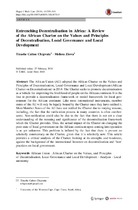| dc.contributor.author | Chigwata, Tinashe Calton | |
| dc.contributor.author | Ziswa, Melissa | |
| dc.date.accessioned | 2019-08-19T07:53:52Z | |
| dc.date.available | 2019-08-19T07:53:52Z | |
| dc.date.issued | 2018 | |
| dc.identifier.citation | Chigwata, T.C. and Ziswa, M. 2018. Entrenching Decentralisation in Africa: A Review of the African Charter on the Values and Principles of Decentralisation, Local Governance and Local Development. Hague J Rule Law, 10 295–316. | en_US |
| dc.identifier.uri | http://hdl.handle.net/10566/4822 | |
| dc.description | The African Union (AU) adopted the African Charter on the Values and Principle of Decentralisation, Local Governance and Local Development (African Charter on Decentralisation) in 2014. The African Charter on Decentralisation was inspired by the Yaounde Declaration of 2005 which was adopted by the African Ministers in charge of Decentralisation and Local Development in their respective countries. The Yaounde Declaration stresses the importance of a participatory democracy where local communities, groups and organisations can deliberate on their own needs, develop their own programmes for change, and influence policy processes to respond to those needs | en_US |
| dc.description.abstract | The African Union (AU) adopted the African Charter on the Values and Principles of Decentralisation, Local Governance and Local Development (African Charter on Decentralisation) in 2014. The Charter seeks to promote decentralisation as a vehicle for improving the livelihood of people on the African continent. It is the first to provide a decentralisation framework or model framework for local government for the African continent. Like most international instruments, member states of the AU will only be legally bound by the Charter once they have ratified it. Most Member States of the AU have not ratified the Charter due to varying reasons, including, the fact that the ratification process in many countries is often cumbersome. Non-ratification could also be due to the fact that there is not yet a clear understanding of the meaning and significance of the decentralisation framework which the Charter provides. Thus, the actual impact of the Charter on changing the poor state of local government on the African continent upon coming into operation is as yet unknown. This problem is inflated by the fact that there is present no scholarly commentary on the Charter, given that it is relatively new. This article provides a critical analysis of the Charter, looking at its strengths and weakness, against the background of the international literature on decentralisation and ‘best’ practices on local government. | en_US |
| dc.language.iso | en | en_US |
| dc.publisher | The Hague Journal on the Rule of Law | en_US |
| dc.subject | Decentralisation | en_US |
| dc.subject | Local autonomy | en_US |
| dc.subject | Framework | en_US |
| dc.subject | African Charter | en_US |
| dc.subject | Local development | en_US |
| dc.title | Entrenching decentralisation in Africa: A review of the African Charter on the values and principles of decentralisation, local governance and local development | en_US |
| dc.type | Article | en_US |

